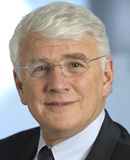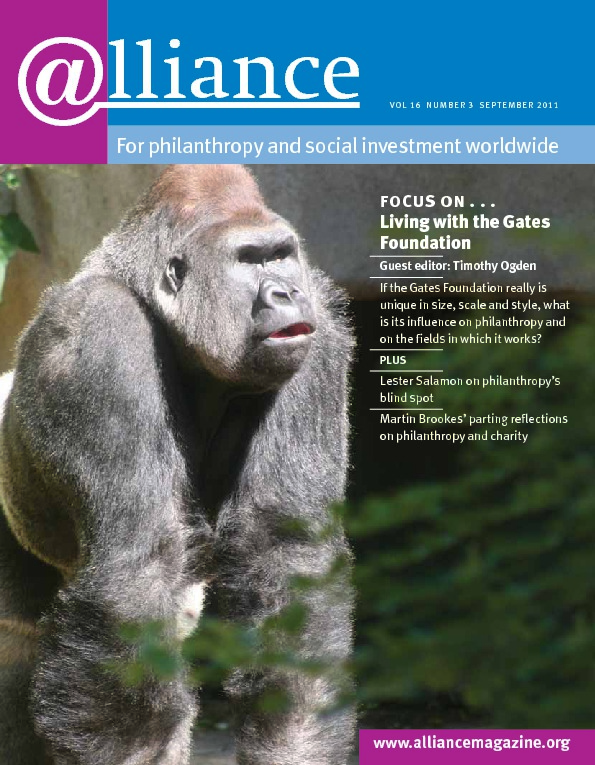European foundations have very different traditions from their US counterparts, and attitudes to wealth and philanthropy are very different on either side of the Atlantic. So what influence has the Gates Foundation, with its vast wealth and the highly public way it deploys it, had on philanthropy in Europe? At the recent EFC conference in Portugal, Caroline Hartnell put this question to Francis Charhon of Fondation de France and Luc Tayart de Borms of King Baudouin Foundation.
 Luc Tayart believes that the effect on European foundations is limited ‘because they are not really present. They have now opened an office in the UK but until recently they have not come into the European philanthropy world.’ In any case, their approach is distinct from that of most European foundations. ‘We don’t try to change the world by throwing big money at a problem – unlike in the US where the Ford Foundation and others have spent large amounts on certain issues. We don’t have that tradition in Europe, we are more niche players, so in that sense I don’t think it has influenced a lot of our work.’
Luc Tayart believes that the effect on European foundations is limited ‘because they are not really present. They have now opened an office in the UK but until recently they have not come into the European philanthropy world.’ In any case, their approach is distinct from that of most European foundations. ‘We don’t try to change the world by throwing big money at a problem – unlike in the US where the Ford Foundation and others have spent large amounts on certain issues. We don’t have that tradition in Europe, we are more niche players, so in that sense I don’t think it has influenced a lot of our work.’
‘We are working on the edge and margin of change,’ agrees Francis Charhon. ‘The magnitude of the money isn’t the same – in Europe you couldn’t put a billion euros on the table; that’s the role of the state.’ That said, he believes ‘a big new player does open up new possibilities’. However, he points out, ‘it’s not the first time a philanthropist has given a lot of money. Soros, for example, gave a lot and we saw a lot of change in eastern Europe.’
More visible philanthropy
 Charhon believes that Gates’ most significant effect stems not from the sums involved but from the fact that it makes philanthropy more visible. ‘It is creating a more open mind among some people in France who see that we can do things in philanthropy,’ he says. ‘People in Europe can say, “OK, there are big philanthropies there, we could do that in our country”.’
Charhon believes that Gates’ most significant effect stems not from the sums involved but from the fact that it makes philanthropy more visible. ‘It is creating a more open mind among some people in France who see that we can do things in philanthropy,’ he says. ‘People in Europe can say, “OK, there are big philanthropies there, we could do that in our country”.’
Tayart agrees: ‘It’s true that the media are suddenly showing more interest in philanthropy because of the Giving Pledge, and that may inspire other people.’ But he worries that it may give the impression that to do good philanthropic work ‘you need big amounts and you need to be a big player. And that’s the opposite of what we at KBF believe. We say you can do something simple for your village or for one specific illness and you can be very relevant as long as you are very focused on what you’re doing.’
‘The positive thing,’ he sums up, ‘is more interest in philanthropy. ‘The danger is that it gives the impression you have to be huge to do relevant things.’
‘Too much power within a democracy…’
One of the key questions that the introduction of large amounts of private money throws up for Francis Charhon is that of legitimacy: ‘How you can influence policy with big money, it’s a new question. It has opened a whole new field of reflection.’ On the one hand, significant gifts can be ‘important for building the capacity of the country to build a really strong education and health system’. On the other, he argues, ‘if you work in a developing country where the government is weak you may actually change government policy – for example, they will focus on a project that has been driven by the donor’.
‘Too much power within a democracy can be a bad thing,’ he observes. ‘I think it’s an unwritten agreement of the government to give you the capacity and freedom to work on certain things, so you share the weight of health and education and so on, but the government must create the framework.’
For Tayart, the issue of public benefit is critical, ‘We all applauded when Wellcome put lots of money into the genome project,’ he says. ‘It was big money but for public benefit. So the big question is, is the money being spent for public benefit and is it in partnership with governments or imposing on them?’ But this isn’t just Gates’ responsibility, he insists: ‘It’s about how far governments let him impose.’
Both agree that the question will be posed much more sharply if the government in question is that of a developing country. In developed societies, philanthropy has to position itself alongside government and civil society. ‘I think if the Gates Foundation can succeed in changing the education system in the US,’ adds Francis Charhon, ‘it will be a great thing – but to do it they will be need to be connected to cities, elected representatives, trade unions, etc.’ In developing countries, a foundation like Gates will have weaker partners and more freedom to act.
Who makes the decisions?
The question of power and influence has ramifications at a number of levels. At a recent conference in Seattle, for instance, the editor of the Lancet medical journal expressed concern that ‘something weird is going on in the world of global health science’. In the words of Tom Paulson (Humanosphere, 17 March 2011), he fears that the ‘center of gravity for global health research is increasingly shifting away from the traditional multilateral institutions of public health based in Europe (like the World Health Organization?) and is increasingly dominated by American academic institutions (like the Gates Foundation-funded Institute for Health Metrics and Evaluation here in Seattle?)’.
This concern is not limited to the editor of the Lancet, says Tayart: ‘I think if you speak to some European parliamentarians … they are afraid that the agenda setting is no longer done by those who have been democratically elected.’ But, he insists, it’s the boards of organizations like the World Health Organization that set the agenda. ‘Again, it’s not Gates’ fault if they follow him. They have democratic legitimacies and if he wants to partner with them he cannot impose things.’
Something else that can crucially affect the way foundations’ legitimacy is perceived is the question of who, within foundations, makes the decisions about how money is spent. In the Gates Foundation, it is the four-person board that makes the decisions. In contrast, says Tayart, at KBF decisions about where the money goes are always made by selection committees comprising people from different backgrounds. ‘And that gives us legitimacy,’ he says. In addition, he isn’t sure that the Gates Foundation always has a complete enough idea of what is happening in the field – at least to the extent that they rely on information from their grantees, who are in a very dependent situation, which may not always allow for openness in their conversations with the foundation.
Behind all this is the anxiety that if the Gates Foundation is seen to be exerting an undue and unaccountable influence through its wealth, the rest of the foundation sector could suffer. ‘You could have a reaction that backfires on foundations,’ suggests Charhon. ‘The foundation sector is not very strong and the press pick up on each thing that doesn’t work very well.’
A matter of status
Nobody in Europe has yet signed up to the Giving Pledge. Both Tayart and Charhon believe that the reason for this is the different attitudes to wealth on either side of the Atlantic. In Europe, there is a high degree of scepticism both about the motives of wealthy people who want to give and about how they got their money in the first place. People ask questions like ‘why is he doing that? What is behind it? Why doesn’t he distribute the money to the workers?’
In contrast, believes Tayart, in the US it’s a way of acquiring status. ‘In Europe,’ he says, ‘if someone is successful they hope to receive a knighthood or some other national decoration. In the US national decorations like this aren’t on offer but being a big philanthropist is a status symbol.’
Working with government
For Tayart, one of the most positive aspects of the Gates Foundation approach is their focus on working with governments and international institutions – despite the less central role accorded to the state in welfare provision in the US. ‘They have always linked up with multilaterals and governments, which for American foundations is quite exceptional. They have recognized that they are not the only one.’ Charhon agrees that the Gates Foundation ‘has recognized the role of government’, but this takes him back to the question of influence, and the danger that a foundation might ‘change the role of government because it has a lot of money’.
Overall, both feel that while the amount of money the Gates Foundation has at its disposal is bound to have a significant effect on philanthropy, the precise nature of that effect is as yet incalculable. ‘What we can say is that it opens a new form of philanthropy because it’s so huge,’ says Charhon. ‘It’s a new way of working.’
For the present and immediate future, the main issue to keep an eye on is legitimacy. ‘The pledge will create a strange effect,’ believes Charhon. ‘People will control the philanthropic arena with their billions. Who controls these people? For the sake of all foundations, we have to think about the legitimacy of the donation.’
Francis Charhon is managing director of Fondation de France. Email Francis.CHARHON@fdf.org
Luc Tayart de Borms is managing director of King Baudouin Foundation. Email TAYART.L@Kbs-frb.be
Francis Charhon awarded EFC Philanthropy Compass Prize
At the EFC’s 22nd Annual General Assembly (AGA) and Conference in Portugal, Francis Charhon received the EFC Philanthropy Compass Prize, which honours individuals who have had a major impact on European philanthropy. Charhon, one of the founders of Doctors Without Borders, joined Fondation de France as president in 1992, and since then has held many other leadership roles in the philanthropic world. In his introduction, Luc Tayart de Borms emphasized Charhon’s critical contribution to the EFC, saying: ‘You are one of those who have made the EFC what it is today.’






Comments (0)